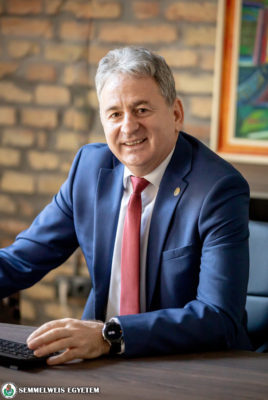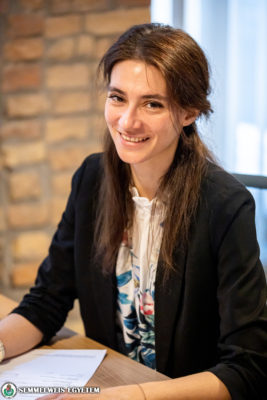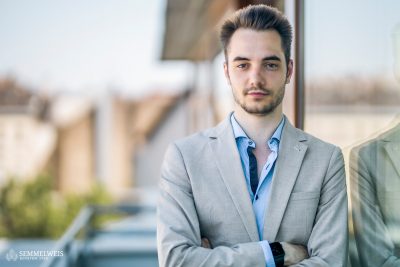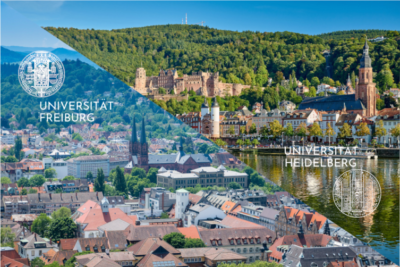“The new application cycle of the Erasmus+ program begins in 2021, which will offer several new opportunities to students and staff, such as the European Universities Initiative, Europass Teacher Academy, Centers for Vocational Excellence and DiscoverEU”, highlighted Dr. Marcel Pop. In the interview, the Director of the Directorate of International Relations talked about the most important results and milestones of the previous 7-year cycle of the Erasmus+ program.
 “Semmelweis University has successfully applied for the 2021/2027 cycle of the Erasmus+ program, which has been operating in Hungary and at the university for more than 20 years. Therefore, the opportunities provided by the program are continued to be offered to university students and staff. In the framework of the new cycle, the mobility programs available for students (semester part-time training in foreign higher education institutions, internship abroad, postgraduate internship) as well as mobility program opportunities for teachers and administration staff which enable the exchange of experiences and knowledge sharing will continue to be offered”, highlighted Dr. Marcel Pop, director of the Directorate of International Relations.
“Semmelweis University has successfully applied for the 2021/2027 cycle of the Erasmus+ program, which has been operating in Hungary and at the university for more than 20 years. Therefore, the opportunities provided by the program are continued to be offered to university students and staff. In the framework of the new cycle, the mobility programs available for students (semester part-time training in foreign higher education institutions, internship abroad, postgraduate internship) as well as mobility program opportunities for teachers and administration staff which enable the exchange of experiences and knowledge sharing will continue to be offered”, highlighted Dr. Marcel Pop, director of the Directorate of International Relations.
According to Dr. Nóra Seres Schreiberné, institutional Erasmus coordinator of the International Mobility Office, the programs offered during the new cycle will be even more receptive, more “green” and more digital: environmentally friendly approaches will come to the forefront, for example as part of the green travel support, additional resources might be available in case of choosing an environmentally friendly mode of transport.
“Next-generation techniques in the EU’s digital strategy, the support of digital education, the use of smart devices in classrooms and learning by digital games are emerging. In addition, mixed forms of mobility will await the applicants, which will allow the scholarship period to be completed with a mix of physical and virtual participation. Furthermore, forward-looking initiatives will also be supported such as the European Universities Initiative, Europass Teacher Academy, Centers for Vocational Excellence and DiscoverEU”, Dr. Nóra Seres Schreiberné said.
“The Erasmus program works very well at Semmelweis University, which is also due to the fact that when it started 20 years ago, the institution already had 10 years of experience in educating foreign students in its English and German language programs. The aim of the Erasmus program initiated by the European Committee is to provide students in higher education with the opportunity to experience the culture and education system of another country, the different teaching methods, also what it is like to live and study in another country. Today, nearly 200 university students spend an average of one semester in other, mostly European Union countries, and the same number come to the university from abroad in the framework of scholarships. Semmelweis University places a great emphasis on nurturing and developing its international relations, one of the foundations of which is the wide range of international mobility programs”, Dr. Marcel Pop said.
As an advantage of the program, he mentioned that participating students can strengthen their linguistic and cultural competence in addition to professional development. Teachers may acquire key skills, professional, linguistic and teaching methodological knowledge, which they can use at the home institution as well upon their return.
 Referring to the epidemiological situation, Dr. Nóra Seres Schreiberné pointed out that although the current number of participants is smaller, the program is still operating. It is still possible to travel abroad in the framework of Erasmus+ in accordance with the requirements of the host country and strict compliance with epidemiological requirements. She emphasized that as soon as conditions allow, they are ready to operate the program again at full force, at a normal level, which is well represented by the recently published call for proposals for the partial training of the 2021/2022 academic year.
Referring to the epidemiological situation, Dr. Nóra Seres Schreiberné pointed out that although the current number of participants is smaller, the program is still operating. It is still possible to travel abroad in the framework of Erasmus+ in accordance with the requirements of the host country and strict compliance with epidemiological requirements. She emphasized that as soon as conditions allow, they are ready to operate the program again at full force, at a normal level, which is well represented by the recently published call for proposals for the partial training of the 2021/2022 academic year.
Summarizing the results of the last seven years of Erasmus+, Dr. Marcel Pop mentioned as a key milestone that the mobility framework has been continuously expanded, with agreements reaching approximately 100 institutions. He highlighted that in 2018, the program was extended to include students in foreign language training, almost doubling the number of participants. Dr. Nóra Seres Schreiberné pointed out that the number of participants in the incoming student and teacher mobility has greatly increased in recent years, which they would like to keep in the future as well. Dr. Marcel Pop added that there was a sort of optimization of the student and teacher mobility framework, since they expanded the collaborations, but at the same time, taking the reception capacities and needs into account, they aimed at creating the most optimal incoming and outgoing mobility in a close cooperation with the faculties. He pointed out that the grants received by the university increased year by year. He mentioned the extension of the program beyond Europe in the framework of International Credit Mobility as an important milestone, as well as the introduction of post-graduate internships that provide support in finding a job in the labor market, which is extremely popular with graduate students who are unable to take advantage of the internship opportunities offered by the program during their studies. He emphasized that with the accession of András Pető Faculty in 2017 and the integration of vocational training institutions, the university also expanded the number of projects available under the Erasmus+ program. Dr. Marcel Pop recalled that Erasmus+ celebrated its 30th anniversary in 2017, on the occasion of which a two-day conference and workshop was organized in close cooperation with student organizations. He spoke about the Erasmus Staff Week organized in 2018, which was attended by participants from the medical faculties of 13 European universities.
 “We seek to make use of the opportunities even more efficiently in the next 7-year cycle. We consider it a priority to continue to provide applicants with the most efficient background services possible, with which we aim to contribute to the university’s even wider dissemination and to improve its ranking in university rankings. In order to reach this, we continue to work closely with the faculties and every organization unit concerned”, Dr. Marcel Pop said.
“We seek to make use of the opportunities even more efficiently in the next 7-year cycle. We consider it a priority to continue to provide applicants with the most efficient background services possible, with which we aim to contribute to the university’s even wider dissemination and to improve its ranking in university rankings. In order to reach this, we continue to work closely with the faculties and every organization unit concerned”, Dr. Marcel Pop said.
Bernadett Bódi
Photo: Attila Kovács – Semmelweis University
Translation: Katalin Illés-Romhányi


